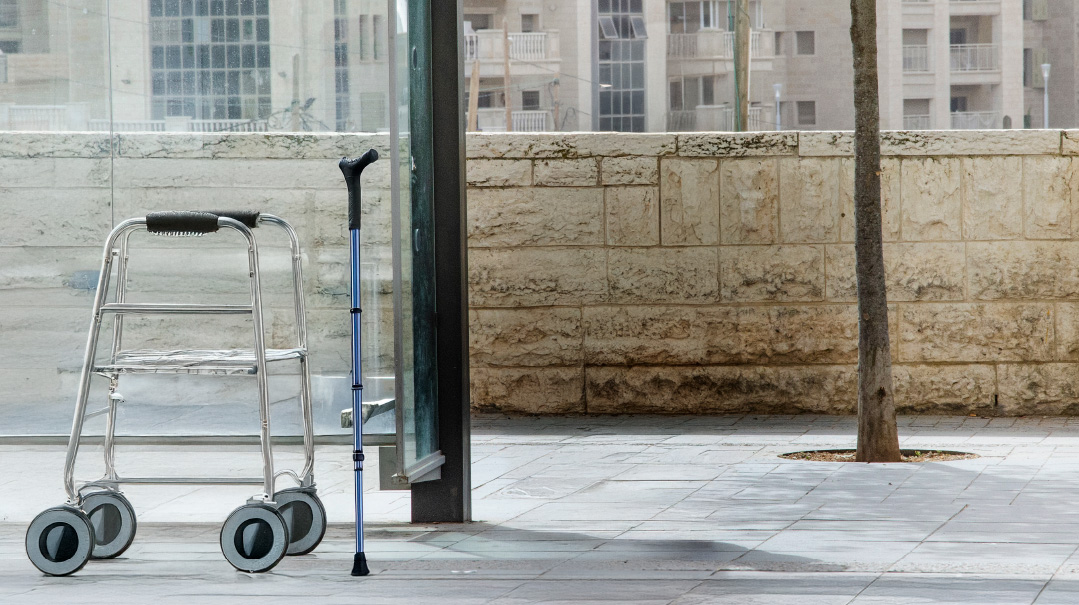Someone to Lean On
| December 10, 2024The presence of a friend, she realized, made her feel less alone. A friend. My friend is here

T
he women had nothing in common but a shattered lower limb.
In the wheelchair, her face brittle under her white netela, Mazal stared at nothing. Karen, in knee-length denim, drove a walker at seven inches per minute. Eventually, their gazes met.
Karen pushed the walker to one side and moved toward a chair. Mazal saw the slow-motion lowering, the white-knuckled grip on the walker arm, the furrows between Karen’s tent-shaped eyes.
“Slippery bathroom tiles.” Karen gestured to her hip, which now housed steel bolts.
“Leg infection,” Mazal replied. Her English had always been excellent, her consonants almost British. Now she had this new word in modern Hebrew, too. “I stepped on metal in Sudan. On my way to Israel. It was hidden under a bush.”
The women nodded at each other, sharing an experience that had no words. Their bones had become hollow straws to channel pain. It had filled them in hot, pillaging spikes. The snapping, sprouting pain bush had seemed intent on pushing all organs to the outside. Each woman could see it now behind the other’s eyes, filling her head, threatening to wear her brain like a crown. I am the heat and the heat is everything, and what is pain, really, when I am disintegrating, and we are all just part of a whole?
There’s a sisterhood between people who reawaken every moment to shock. That a person could absorb such a blow and not have their life ended!
“It was four days from when I got the cut until we came to Israel.” The reeking black wound had spread until Mazal no longer knew her own name. Normally, a woman in such a state would exhale and gratefully accept a nonrefundable relief. But Mazal had been on her way to the Holy Land. Her heart would not release its clamp on her soul.
“When the plane landed, they brought me straight to the hospital. My son Moshe carried me.” Moshe, who had been living in Israel for years, had toted her like a child through the vast cold place, up a moving staircase. “Newspapers said I was afraid of the — the — escalator. They took pictures of me. But I couldn’t walk.” The papers had reported her to be a primitive little woman. (She may have been a little afraid of the living stairs.) Weeks later, her eyes still prickled at the humiliation.
Karen nodded and put a hand on Mazal’s. “When I was waiting for help, on the floor, for two days, I thought maybe even Death had forgotten me. At the same time, I didn’t want anyone to find me,” she said.
The orderly who had deposited Mazal in the hallway now came back, tailed by a woman with an ersatz smile. “Mazal, I see you made a friend!” she cooed with synthetic kindness. “Are we ready to try again? It’s very important that we exercise, okaaaay?”
Mazal saw Karen’s asymmetrical smirk, her subtle side-eye roll. Like a teenager, she felt her face mirror this sympathetic contempt. Karen took Mazal’s elbow and shoved it lightly upward. Yes, this woman was revolting. But yes, they must try.
Karen gripped her walker with her left hand and Mazal’s elbow with her right. “Miserable smiling shrew,” she whispered in Mazal’s ear. “Learned stretching from Torquemada. Who needs this?”
Excellent English or not, this combination of words was opaque. But Mazal saw a blue-veined hand on her elbow, felt her lips flicker and her soul change color. She accepted the proffered rubber-tipped cane. Planting it in front of her, she heaved upward.
It took three tries to stand, but oddly, Mazal did not feel let down. The presence of a friend, she realized, made her feel less alone. A friend. My friend is here.
Oops! We could not locate your form.







